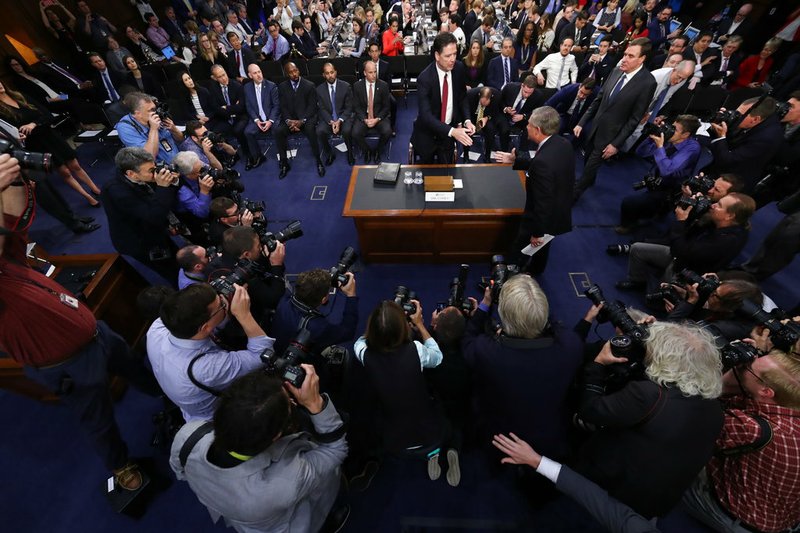WASHINGTON — Former FBI Director James Comey asserted Thursday that President Donald Trump fired him to interfere with his investigation of Russia's role in the 2016 election and its ties to the Trump campaign.
"It's my judgment that I was fired because of the Russia investigation," Comey told the Senate intelligence committee.
"I was fired in some way to change, or the endeavor was to change, the way the Russia investigation was being conducted," Comey testified under oath. "That is a very big deal, and not just because it involves me."
Comey also accused the Trump administration of spreading "lies, plain and simple" about him and the FBI in the aftermath of his abrupt firing last month, declaring that the administration "defamed him and more importantly the FBI" by claiming the bureau was in disorder under his leadership. And Comey described intense discomfort about their one-on-one conversations, saying he decided he immediately needed to document the discussions in memos.
"I was honestly concerned that he might lie about the nature of our meeting, so I thought it really important to document," Comey said. "I knew there might come a day when I might need a record of what happened not only to defend myself but to protect the FBI."
RELATED COVERAGE
http://www.arkansas…">ALL UPDATES: Comey testifies about president, Russia in public hearing
http://www.arkansas…">Arkansas Sen. Tom Cotton questions Comey on Trump, Russia
The revelations came as Comey delivered his much anticipated first public telling of his relationship with Trump. The former director immediately dove into the heart of the controversy around his firing and whether Trump interfered in the bureau's Russia investigation, as he elaborated on written testimony delivered Wednesday. In that testimony he had already disclosed that Trump demanded his "loyalty" and directly pushed him to "lift the cloud" of investigation by declaring publicly the president was not the target of the FBI probe into his campaign's Russia ties.
Comey said that he declined to do so in large part because of the "duty to correct" that would be created if that situation changed. Comey also said in his written testimony that Trump, in a strange private encounter near the grandfather clock in the Oval Office, pushed him to end his investigation into former National Security Adviser Michael Flynn.
Democratic Sen. Joe Manchin of West Virginia asked Comey the key question: "Do you believe this arises to obstruction of justice?"
"I don't know. That's Bob Mueller's job to sort that out," Comey responded, referring to the newly appointed special counsel who has taken over the Justice Department's Russia investigation.
Comey revealed that after his firing he had actually tried to spur the special counsel's appointment by giving one of his memos about Trump to a friend of his to leak to the press.
"My judgment was I need to get that out into the public square," Comey said.
Trump himself was expected to dispute Comey's claims that the president demanded loyalty and asked the FBI director to drop the investigation into Flynn, according to a person close to the president's legal team who demanded anonymity because of not being authorized to discuss legal strategy. The president has not yet publicly denied the specifics of Comey's accounts but has broadly challenged his credibility, tweeting last month Comey "better hope there are no 'tapes'" of the conversations.
"Lordy, I hope there are tapes," Comey remarked at one point Thursday, suggesting such evidence would back up his account over any claims from the president.
But it was a Democrat, Sen. Dianne Feinstein of California, who asked the question that many Republicans have raised in the weeks since Comey's firing as one media leak followed another revealing Comey's claims about Trump's inappropriate interactions with him.
Discussing the Oval Office meeting where Comey says Trump asked him to back off Flynn, Feinstein asked: "Why didn't you stop and say, 'Mr. President, this is wrong,'?"
"That's a great question," Comey said. "Maybe if I were stronger I would have. I was so stunned by the conversation I just took it in."
Read Friday's Arkansas Democrat-Gazette for full details.

